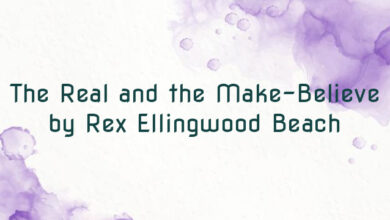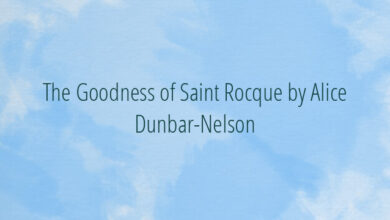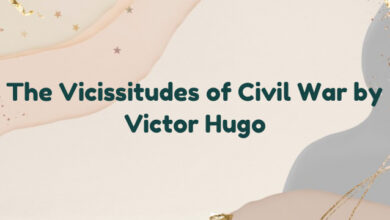
Where Is The Tropic Of Capricorn?? by Richard Connell
“One, two, three, bend! One, two, three, bend!” So barked the physical instructor, a bulgy man with muscles popping out all over him as if his skin had been stuffed with hard-boiled eggs.
Little Peter Mullaney oned, twoed, threed and bent with such earnest and whole-hearted violence that his blue eyes seemed likely to be jostled from their sockets and the freckles to be jarred loose from his thin, wiry arms. Though breathless, and not a little sinew-sore from the stiff setting-up exercises, his small, sharp-jawed face wore a beatified look, the look that bespeaks the rare, ecstatic thrill that comes to mortals so seldom in this life of taxes, prohibitions and denied ambitions. Such a look might a hero-worshiping boy wear if seen by his gang in the company of Jack Dempsey, or a writer if caught in the act of taking tea with Shaw. Peter Mullaney was standing at the very door of his life’s ambition; he was about to be taken “on the cops.”
To be taken “on the cops”–the phrase is departmental argot and is in common use by those who enjoy that distinction–this had been the ideal of Peter Mullaney since the days when he, an undersized infant, had tottered around his Christopher Street back-yard, an improvised broom-stick billy in his hand, solemnly arresting and incarcerating his small companions. To wear that spruce, brass-button studded blue uniform, and that glittering silver shield, to twirl a well-trained night-stick on its cord, to eye the layman with the cold, impassive eye of authority, to whisper mysterious messages into red iron signal boxes on street-corners, to succor the held-up citizen and pursue the crook to his underworld lair, to be addressed as “Officer”–he had lived for this dream.
And here he was, the last man on a row of thirty panting, perspiring probationary patrolmen, ranged, according to height, across the gymnasium of the police training school. From big Dan Mack, six feet four in his socks, they graded down as gently as a ramp to little Peter on the end of the line a scant, a bare five feet five and seven-eighths inches tall including the defiant bristle of his red pompadour.
Peter was happy, and with reason. It was by no generous margin that Peter had gained admission to the school that was to prepare him for his career. By the sheerest luck he had escaped being cast into the exterior darkness; by the slimmest degree he had wiggled into the school, and whether he could attain the goal on which he had kept his eye for twenty years–or ever since he was four–was still decidedly in doubt. The law said in plain, inexorable black and white that the minimum height a policeman can be is five feet and six inches. Peter Mullaney lacked that stature by the distance between a bumble-bee’s eyes; and this, despite the fact that for years he had sought most strenuously, by exercise, diet and even torture to stretch out his body to the required five feet six. When he was eighteen and it seemed certain that an unsympathetic fate had meant him to be a short man, his father found him one day in the attic, lashed to a beam, with a box full of window-weights tied to his feet, and his face gray with pain.
“Shure, me bye,” remarked old man Mullaney as he cut Peter down, “are ye after thinkin’ that the Mullaneys is made of Injy rubber? Don’t it say in the Bible, ‘What man by takin’ thought can add a Cupid to his statue?'”
Peter, in hot and anguished rebellion against this all too evident law of nature had sought relief by going straight out of the house and licking the first boy he met who was twice as big as he was, in a fight that is still remembered in the Second Ward. But stretching and wishing and even eating unpleasant and expensive tablets, alleged by their makers to be made from giraffes’ glands, did not bring Peter up to a full and unquestionable five feet six.
When Peter came up for a preliminary examination which was to determine whether he possessed the material from which policemen are made, Commissioner Kondorman, as coldly scientific as his steel scales and measures, surveyed the stricken Peter, as he stood there on the scales, his freckles in high relief on his skin, for he was pale all over at the thought that he might be rejected.
“Candidate Mullaney,” said the Commissioner, “you’re too short.”
Peter felt marble lumps swelling in his throat.
“If you’d only give me a chance, Commissioner,” he was able to gulp out, “I’d—-“
Commissioner Kondorman, who had been studying the records spread on his desk, cut the supplicant short with:
“Your marks in the other tests are pretty good, though you seem a little weak in general education. But your strength test is unusually high for a small man. However, regulations are regulations and I believe in sticking to them. Next candidate!”
Peter did not go.
“Commissioner,” he began urgently, “all I ask is a chance—-“
His eyes were tense and pleading.
The Chief Inspector, grizzled Matthew McCabe, plucked at the Commissioner’s coat-sleeve.
“Well, Chief?” inquired Commissioner Kondorman, a little impatiently.
“He’s a good lad,” put in the Chief Inspector, “and well spoke of in the Second Ward.”
“He’s under height,” said the Commissioner, briefly.
“But he knows how to handle his fists,” argued the old Chief Inspector.
“Does he?” said the Commissioner, skeptically. “He looks rather small.” He examined Peter through his eye-glasses; beneath that chill and critical gaze Peter felt that he had shrunk to the size of a bantam rooster; the lumps in his throat were almost choking him; in an agony of desperation, he cried,
“Bring in the biggest man you got. I’ll fight him.”
The Commissioner’s face was set in hard, and one would have thought, immovable lines, yet he achieved the feat of turning up, ever so slightly, the corners of his lips in an expression which might pass as the germ of a smile, as he gazed at the small, nude, freckled figure before him with its vivid shaving-brush hair, its intense eyes and its clenched fists posed in approved prize-ring form. Again the official bent over the records and studied them.
“Character recommendations seem pretty good,” he mused. “Never has used tobacco or liquor—-“
“‘Fraid it might stunt me,” muttered Peter, “so I couldn’t get on the cops.”
The commissioner stared at him with one degree more of interest.
“Give the lad a chance,” urged the Chief Inspector. “He only lacks a fraction of an inch. He may grow.”
“Now, Chief,” said the Commissioner turning to the official by his side, “you know I’m a stickler for the rules. What’s the good of saying officers must be five feet six and then taking men who are shorter?”
“You know how badly we need men,” shrugged the Chief Inspector, “and Mullaney here strikes me as having the making of a good cop. It will do no harm to try him out.”
The Commissioner considered for a moment. Then he wheeled round and faced Peter Mullaney.
“You’ve asked for a chance,” he shot out. “You’ll get it. You can attend police training school for three months. I’ll waive the fact that you’re below the required height, for the time being. But if in your final examinations you don’t get excellent marks in every branch, by the Lord Harry, you get no shield from me. Do you understand? One slip, and good-by to you. Next candidate!”
They had to guide Peter Mullaney back to his clothes; he was in a dazed blur of happiness.
Next day, with the strut of a conqueror and with pride shining from every freckle, little Peter Mullaney entered the police training school. To fit himself physically for the task of being a limb of the law, he oned, twoed, threed and bent by the hour, twisted the toes of two hundred pound fellow students in frantic jiu jitsu, and lugged other ponderous probationers about on his shoulders in the practice of first aid to the injured. This physical side of his schooling Peter enjoyed, and, despite his lack of inches, did extremely well, for he was quick, tough and determined. But it was the book-work that made him pucker his brow and press his head with his hands as if to keep it from bursting with the facts he had to jam into it.
It was the boast of Commissioner Kondorman that he was making his police force the most intelligent in the world. Give him time, he was fond of saying, and there would not be a man on it who could not be called well-informed. He intended to see to it that from chief inspector down to the greenest patrolman they could answer, off-hand, not only questions about routine police matters, but about the whole range of the encyclopedia.
“I want well-informed men, intelligent men,” he said. “Men who can tell you the capital of Patagonia, where copra comes from, and who discovered the cotton-gin. I want men who have used their brains, have read and thought a bit. The only way I can find that out is by asking questions, isn’t it?”
The anti-administration press, with intent to slight, called the policemen “Kondorman’s Encyclopedias bound in blue,” but he was not in the least perturbed; he made his next examination a bit stiffer.
Peter Mullaney, handicapped by the fact that his span of elementary schooling had been abbreviated by the necessity of earning his own living, struggled valiantly with weighty tomes packed with statutes, ordinances, and regulations–what a police officer can and cannot do about mayhem, snow on the sidewalks, arson, dead horses in the street, kidnaping, extricating intoxicated gentlemen from man-holes, smoking automobiles, stray goats, fires, earthquakes, lost children, blizzards, disorderly conduct and riots. He prepared himself, by no small exertion, to tell an inquiring public where Bedford street is, if traffic can go both ways on Commerce street, what car to take to get from Hudson street to Chatham Square, how to get to the nearest branch library, quick lunch, public bath, zoo, dispensary and garage, how to get to the Old Slip Station, Flower Hospital, the St. Regis, Coney Island, Duluth and Grant’s Tomb. He stuffed himself with these pertinent facts; he wanted to be a good cop. He could not see exactly how it would help him to know in addition to an appalling amount of local geography and history, the name of the present ruler of Bulgaria, what a zebu is, and who wrote “Home, Sweet Home.” But since questions of this sort were quite sure to bob up on the examination he toiled through many volumes with a zeal that made his head ache.
When he had been working diligently in the training school for three months lacking a day, the great moment came when he was given a chance to put theory into practice, by being sent forth, in a uniform slightly too large for him, to patrol a beat in the company of a veteran officer, so that he might observe, at first hand, how an expert handled the many and varied duties of the police job. Except that he had no shield, no night stick, and no revolver, Peter looked exactly like any of the other guardians of law. He trudged by the side of the big Officer Gaffney, trying to look stern, and finding it hard to keep his joy from breaking out in a smile. If Judy McNulty could only see him now! They were to be married as soon as he got his shield.
But joy is never without its alloy. Even as Peter strode importantly through the streets of the upper West Side, housing delicious thrills in every corpuscle from the top of his blue cap to the thick soles and rubber heels of his shiningly new police shoes, a worry kept plucking at his mind. On the morrow he was to take his final examination in general education, and that was no small obstacle between him and his shield. He had labored to be ready, but he was afraid.
That worry grew as he paced along, trying to remember whether the Amazon is longer than the Ganges and who Gambetta was. He did not even pay close attention to his mentor, although on most occasions those five blue service stripes on Officer Gaffney’s sleeve, representing a quarter of a century on the force, would have caused Peter to listen with rapt interest to Officer Gaffney’s genial flow of reminiscence and advice. Dimly he heard the old policeman rumbling:
“When I was took on the cops, Pether, all they expected of a cop was two fists and a cool head. But sthyles in cops changes like sthyles in hats, I guess. I’ve seen a dozen commissioners come and go, and they all had their own ideas. The prisint comish is the queerest duck of the lot, wid his “Who was Pernambuco and what the divil ailed him, and who invinted the gin rickey and who discovered the Gowanus Canal.” Not that I’m agin a cop bein’ a learned man. Divil a bit. Learnin’ won’t hurt him none if he has two fists and a clear head.”
He paused to take nourishment from some tabloid tobacco in his hip-pocket, and rumbled on,
“Whin I was took on the cops, as I say, they was no graduatin’ exercises like a young ladies’ siminary. The comish–it was auld Malachi Bannon–looked ye square in the eye and said, ‘Young fella, ye’re about to go forth and riprisint the majesty of the law. Whin on juty be clane and sober and raisonably honest. Keep a civil tongue in your head for ivrybody, even Republicans. Get to know your precinct like a book. Don’t borrow trouble. But above all, rimimber this: a cop can do a lot of queer things and square himself wid me afterward, but there’s one sin no cop can square–the sin of runnin’ away whin needed. Go to your post.'”
Little Peter nodded his head.
They paced along in silence for a time. Then Peter asked,
“Jawn—-“
“What, Pether?”
“Jawn, where is the Tropic of Capricorn?”
Officer Gaffney wrinkled his grey eyebrows quizzically.
“The Tropic of Whichicorn?” he inquired.
“The Tropic of Capricorn,” repeated Peter.
“Pether,” said Officer Gaffney, dubiously, scratching his head with the tip of his night-stick, “I disrimimber but I think–I think, mind ye, it’s in the Bronx.”
They continued their leisurely progress.
“‘Tis a quiet beat, this,” observed Officer Gaffney. “Quiet but responsible. Rich folks lives in these houses, Pether, and that draws crooks, sometimes. But mostly it’s as quiet as a Sunday in Dooleyville.” He laughed deep in his chest.
“It makes me think,” he said, “of Tommie Toohy, him that’s a lieutinant now over in Canarsie. ‘Tis a lesson ye’d do well to mind, Pether.”
Peter signified that he was all ears.
“He had the cop bug worse than you, even, Pether,” said the veteran.
Peter flushed beneath his freckles.
“Yis, he had it bad, this Tommie Toohy,” pursued Officer Gaffney. “He was crazy to be a cop as soon as he could walk. I never seen a happier man in me life than Toohy the day he swaggers out of the station-house to go on post up in the twenty-ninth precinct. In thim days there was nawthin’ up there but rows of little cottages wid stoops on thim; nawthin but dacint, respictable folks lived there and they always give that beat to a recruity because it was so quiet. Well, Toohy goes on juty at six o’clock in the evenin’, puffed up wid importance and polishing his shield every minute or two. ‘Tis a short beat–up one side of Garden Avenue and down on the other side. Toohy paces up and down, swingin’ his night-stick and lookin’ hard and suspicious at every man, woman or child that passes him. He was just bustin’ to show his authority. But nawthin’ happened. Toohy paced up and back, up and back, up and back. It gets to be eight o’clock. Nawthin happens. Toohy can stand it no longer. He spies an auld man sittin’ on his stoop, peacefully smokin’ his evenin’ pipe. Toohy goes up to the old fellow and glares at him.
“‘What are you doin’ there?’ says Toohy.
“‘Nawthin,’ says the auld man.
“‘Well,’ says Toohy, wid a stern scowl, shakin’ his night-stick at the scared auld gazabo, ‘You go in the house.'”
Peter chuckled.
“But Toohy lived to make a good cop for all that,” finished the veteran. “Wid all his recruity monkey-shines, he never ran away whin needed.”
“I wonder could he bound Bolivia,” said Peter Mullaney.
“I’ll bet he could,” said Officer Gaffney, “if it was in his precinct.”
Late next afternoon, Peter sat gnawing his knuckles in a corner of the police schoolroom. All morning he had battled with the examination in general education. It had not been as hard as he had feared, but he was worried nevertheless. So much was at stake.
He was quivering all over when he was summoned to the office of the Commissioner, and his quivering grew as he saw the rigid face of Commissioner Kondorman, and read no ray of hope there. Papers were strewn over the official desk. Kondorman looked up, frowned.
“Mullaney,” he said, bluntly, “you’ve failed.”
“F-failed?” quavered Peter.
“Yes. In general education. I told you if you made excellent marks we’d overlook your deficiency in height. Your paper”–he tapped it with his finger–“isn’t bad. But it isn’t good. You fell down hard on question seventeen.”
“Question seventeen?”
“Yes. The question is, ‘Where is the Tropic of Capricorn?’ And your answer is”–the Commissioner paused before he pronounced the damning words–“‘The Tropic of Capricon is in the Bronx.'”
Peter gulped, blinked, opened and shut his fists, twisted his cap in his hands, a picture of abject misery. The Commissioner’s voice was crisp and final.
“That’s all, Mullaney. Sorry. Turn in your uniform at once. Well?”
Peter had started away, had stopped and was facing the commissioner.
“Commissioner,” he begged—-
“That will do,” snapped the Commissioner. “I gave you your chance; you understood the conditions.”
“It–it isn’t that,” fumbled out Peter Mullaney, “but–but wouldn’t you please let me go out on post once more with Officer Gaffney?”
“I don’t see what good that would do,” said Commissioner Kondorman, gruffly.
Tears were in Peter’s eyes.
“You see–you see—-” he got out with an effort, “it would be my last chance to wear the uniform–and I–wanted–somebody–to–see–me–in–it–just–once.”
The Commissioner stroked his chin reflectively.
“Were you scheduled to go out on post for instruction,” he asked, “if you passed your examination?”
“Yes, sir. From eight to eleven.”
The Commissioner thought a moment.
“Well,” he said, “I’ll let you go. It won’t alter the case any, of course. You’re through, here. Turn in your uniform by eleven thirty, sure.”
Peter mumbled his thanks, and went out of the office with shoulders that drooped as if he were carrying a safe on them.
It was with heavy steps and a heavier heart that little Peter Mullaney, by the side of his mentor, passed the corner where Judy McNulty stood proudly waiting for him. He saluted her gravely with two fingers to his visor–police officers never bow–and kept his eyes straight ahead. He did not have the heart to stop, to speak to her, to tell her what had happened to him. He hadn’t even told Officer Gaffney. He stalked along in bitter silence; his eyes were fixed on his shoes, the stout, shiny police shoes he had bought to wear at his graduation, the shoes he was to have worn when he stepped up to the Commissioner and received his shield, with head erect and a high heart. His empty hands hung heavily at his sides; there was no baton of authority in them; there never would be. Beneath the place his silver shield would never cover now was a cold numbness.
“Damn the Tropic of Capricorn,” came from between clenched teeth, “Damn the Tropic of Capricorn.”
Gaffney’s quick ears heard him.
“Still thinkin’ about the Tropic of Capricorn?” he asked, not knowing that the words made Peter wince. “Well, me bye, ’twill do no harm to know where it is. I’m not denyin’ that it’s a gran’ thing for a cop to be a scholar. But just the same ’tis me firm belief that a man may be able to tell the difference bechune a begonia and a petunia, he may be able to tell where the–now–Tropic of Unicorn is, he may know who wrote “In the Sweet Bye and Bye,” and who invented the sprinklin’ cart, he may be able to tell the population of Peking and Pann Yann, but he ain’t a cop at all if he iver runs away whin needed. Ye can stake your shield on that, me bye.”
His shield? Peter dug his nails into the palm of his hand. Blind hate against the Commissioner, against the whole department, flared up in him. He’d strip the uniform off on the spot, he’d hurl it into the gutter, he’d—-
Officer Gaffney had stopped short. A woman was coming through the night, running. As she panted up to them in the quiet, deserted street, the two men saw that she was a middle-aged woman in a wrapper, and that she was white with fright.
“Burglars,” she gasped.
“Where?” rapped out Officer Gaffney.
“Number 97.”
“Be calm, ma’am. What makes ye think they’re burglars?”
“I heard them…. Moving around…. In the drawing room…. Upstairs.”
“Who are you?” asked the old policeman, imperturbably.
“Mrs. Finn–caretaker. The family is away.”
“Pether,” said Officer Gaffney, “you stay here and mind the beat like a good bucko, while I stroll down to ninety-sivin wid Mrs. Finn.”
“Let me come too, Jawn,” cried Peter.
Gaffney laid his big hand on little Peter’s chest.
“‘Tis probably a cat movin’ around,” he said softly so that Mrs. Finn could not hear. “Lonely wimmin is always hearin’ things. Besides me ambitious but diminootive frind, if they was yeggs what good could ye do wid no stick and no gun? You stay here on the corner like I’m tellin’ you and I’ll be back in ten minutes by the clock.”
Peter Mullaney waited on the corner. He saw the bulky figure of Officer Gaffney proceed at a dignified but rapid waddle down the block, followed by the smaller, more agitated figure of the woman. He saw Officer Gaffney go into the basement entrance, and he saw Mrs. Finn hesitate, then timidly follow. He waited. A long minute passed. Another. Another. Then the scream of a woman hit his ears. He saw Mrs. Finn dart from the house, wringing her hands, screaming. He sprinted down to her.
“They’ve kilt him,” screamed the woman. “Oh, they’ve kilt the officer.”
“Who? Tell me. Quick!”
“The yeggs,” she wailed. “There’s two of them. The officer went upstairs. They shot him. He rolled down. Don’t go in. They’ll shoot you. Send for help.”
Peter stood still. He was not thinking of the yeggs, or of Gaffney. He was hearing Kondorman ask, “Where is the Tropic of Capricorn?” He was hearing Kondorman say, “You’ve failed.” Something had him tight. Something was asking him, “Why go in that house? Why risk your life? You’re not a cop. You’ll never be a cop. They threw you out. They made a fool of you for a trifle.”
Peter started back from the open door; he looked down; the street light fell on the brass buttons of his uniform; the words of the old policeman darted across his brain: “A cop never runs away when needed.”
He caught his breath and plunged into the house. At the foot of the stairs leading up to the second floor he saw by the street light that came through the opened door, the sprawling form of a big man; the light glanced from the silver badge on his broad chest. Peter bent over hastily.
“Is it you, Pether?” breathed Gaffney, with difficulty. “They got me. Got me good. Wan of thim knocked me gun from me hand and the other plugged me. Through the chist. I’m done for, Pether. I can’t breathe. Stop, Pether, stop!”
The veteran tried to struggle to his feet, but sank back, holding fiercely to Peter’s leg.
“Let me go, Jawn. Let me go,” whispered Peter hoarsely.
“They’ll murder you, Pether. It’s two men to wan,–and they’re armed.”
“Let me go in, I tell you, Jawn. Let me go. A good cop never runs–you said it yourself–let me go—-“
Slowly the grip on Peter’s leg relaxed; the dimming eyes of the wounded man had suddenly grown very bright.
“Ye’re right, me little bucko,” he said faintly. “Ye’ll be a credit to the foorce, Pether.” And then the light died out of his eyes and the hand that had grasped Peter fell limp to the floor.
Peter was up the stairs that led to the second floor in three swift, wary jumps. He heard a skurry of footsteps in the back of the house. Dashing a potted fern from its slender wooden stand, he grasped the end of the stand, and swinging it like a baseball bat, he pushed through velvet curtains into a large room. There was enough light there from the moon for him to see two black figures prying desperately at a door. They wheeled as he entered. Bending low he hurled himself at them as he had done when playing football on a back lot. There was a flash so near that it burned his face; he felt a sharp fork of pain cross his head as if his scalp had been slashed by a red-hot knife. With all the force in his taut body he swung the stand at the nearest man; it caught the man across the face and he went down with a broken, guttural cry. A second and a third shot from the revolver of the other man roared in Peter’s ears. Still crouching, Peter dived through the darkness at the knees of the man with the gun; together they went to the floor in a cursing, grunting tangle.
The burglar struggled to jab down the butt of his revolver on the head of the small man who had fastened himself to him with the death grip of a mongoose on a cobra. They thrashed about the room. Peter had gotten a hold on the man’s pistol wrist and he held to it while the man with his free hand rained blow after blow on the defenseless face and bleeding head of the little man. As they fought in the darkness, the burglar with a sudden violent wrench tore loose the clinging Peter, and hurled him against a table, which crashed to the floor with the impact of Peter’s one hundred and thirty pounds of muscle and bone.
As Peter hurtled back, his arms shot out mechanically to break his fall; one groping hand closed on a heavy iron candle-stick that had stood on the table. He was up in a flash, the candle-stick in his hand. His eyes were blinded by the blood from his wound; he dashed the blood away with his coat-sleeve. With a short, sharp motion he hurled the candle-stick at his opponent’s head, outlined against a window, not six feet away. At the moment the missile flew from Peter’s hand, the yegg steadied himself and fired. Then he reeled to the floor as the candle-stick’s heavy base struck him between the eyes.
For the ghost of a second, Peter Mullaney stood swaying; then his hands clawed at the place on his chest where his shield might have been as if his heart had caught fire and he wished to tear it out of himself; then, quite gently, he crumpled to the floor, and there was the quiet of night in the room.
As little Peter Mullaney lay in the hospital trying to see through his bandages the flowers Judy McNulty had brought him, he heard the voice of the doctor saying:
“Here he is. Nasty chest wound. We almost lost him. He didn’t seem to care much whether he pulled through or not. Was delirious for hours. Kept muttering something about the Tropic of Capricorn. But I think he’ll come through all right now. You just can’t kill one of these tough little micks.”
Peering through his bandages, Peter Mullaney saw the square shoulders and stern face of Commissioner Kondorman.
“Good morning, Mullaney,” the Commissioner said, in his formal official voice. “I’m glad to hear that you’re going to get better.”
“Thank you, Commissioner,” murmured Peter, watching him with wondering eyes.
Commissioner Kondorman felt round in an inside pocket and brought out a small box from which he carefully took something that glittered in the morning sunlight. Bending over the bed, he pinned it on the night-shirt of Peter Mullaney. Peter felt it; stopped breathing; felt it again; slowly pulled it out so that he could look at it.
“It was Officer John Gaffney’s,” said the Commissioner, and his voice was trying hard to be official and formal, but it was getting husky. “He was a brave officer. I wanted another brave officer to have his shield.”
“But, Commissioner,” cried Peter, winking very hard with both eyes, for they were blurring, “haven’t you made a mistake? You must have got the wrong man. Don’t you remember? I’m the one that said the Tropic of Capricorn is in the Bronx!”
“Officer Mullaney,” said Commissioner Kondorman in an odd voice, “if a cop like you says the Tropic of Capricorn is in the Bronx, then, by the lord Harry, that’s where the Tropic of Capricorn is.”




